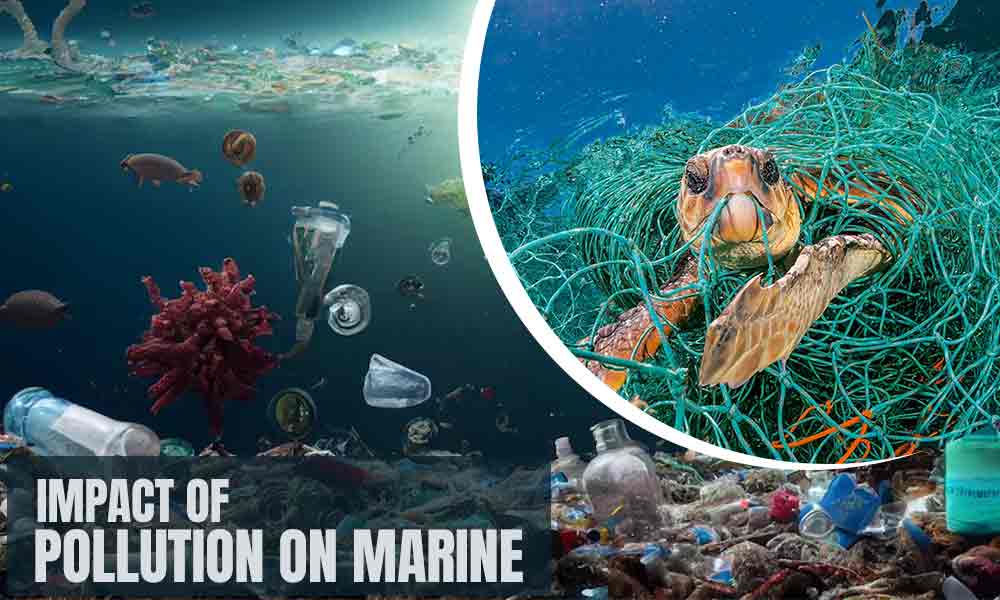The Impact of Pollution on Marine Life: Why We Need to Act Now

Marine pollution is one of the most significant ecological challenges of our time. The world’s oceans are facing unprecedented levels of contamination, and the consequences are devastating for marine life. From plastic waste to oil spills, pollution significantly impacts the ocean and its inhabitants. With over 70% of the earth’s surface covered in water, the ocean is home to an incredible diversity of plant and animal life. However, human activities have severely damaged the delicate balance of marine ecosystems. The destruction of coral reefs, the extinction of species, and a marked decline in fish stocks are just some of the long-term effects of pollution on marine life.
The time has come for us to take action to protect the ocean and its inhabitants. We must understand the impact that pollution has on marine life and the consequences it has for our planet as a whole. In this article, we will examine the impact of pollution on marine life, exploring the different ways in which pollution affects the ocean’s ecosystem. We will also outline the measures we can take to protect our seas and ensure the survival of marine life for generations to come.
Encourage kids to join the fight against water pollution through this video: water pollution for kids.
Pollutants Entering Our Waterways and Oceans
The impact of pollution on marine life is devastating and far-reaching, with consequences that can be felt for generations. Pollution can take many forms, including plastics, chemicals, and agricultural runoff, and can enter our waterways through various means, such as improper disposal, industrial waste, and stormwater runoff. Once in our waterways, these pollutants can cause harm to aquatic animals and plants, disrupt food chains, and alter fragile marine ecosystems. The importance of addressing pollution cannot be overstated, as the health of our oceans and the animals that call them home are inextricably linked to the health of our planet as a whole.
The Effect on Coral Reefs, Fish, and Other Marine Life
Pollution has a significant impact on marine life, especially on coral reefs and fish. The marine life that lives in and around coral reefs is particularly vulnerable to pollution. The chemicals and pollutants in the water can kill coral, harm fish, and other organisms that are dependent on it. Corals are especially sensitive to pollution, as their symbiotic relationship with algae is disrupted, leading to coral bleaching and even death. Fish, on the other hand, can be affected by pollutants in several ways. They may be directly harmed by pollutants, or they may consume contaminated algae or contaminated prey, which can affect their growth, reproduction, and survival. Moreover, marine life can also mistake plastic waste or discarded fishing nets as food, which can lead to fatal injuries or become trapped.
The Impact of Plastic Waste and Other Trash
According to estimates, over eight million metric tons of plastic enter the oceans each year, and that number is expected to increase in the coming years. Plastic waste can break down into microplastics which can be ingested by marine life including fish, turtles, and birds. This not only causes physical harm to the animals, but it can also impact their overall health and reproductive abilities.
The Potential for Long-term Damage to Ocean Ecosystems
A key concern is the accumulation of plastic in oceans, with estimates suggesting there are up to 5.25 trillion macro- and microplastics in the ocean. These materials harm marine life when ingested or entangled, and they also increase the risk of chemical pollutants that stick to the plastic entering the food chain. Additionally, oil spills are another example of pollution that causes long-term damage to ocean ecosystems. They can lead to the death of fish and birds, and alter the habitat for decades. The damage from these types of pollution can cause ecosystem changes that ripple up and down the food chain, leading to the disruption of the balance of ocean life.
The Need to Reduce Emissions from Ships, Factories, and Vehicles
One of the major ways that pollution impacts marine life is through the release of harmful emissions from ships, factories, and vehicles. These emissions can lead to acidification of the ocean, which is damaging to many marine organisms. Marine mammals and fish can also be affected by the release of pollutants such as nitrogen and oil spills. In addition to harming marine life, these emissions contribute to global climate change, which can have a ripple effect on the entire planet. Innovative solutions, such as the use of renewable energy sources and the promotion of sustainable transportation, can help to mitigate the negative impacts of pollution on marine ecosystems.
The Importance of Reducing Our Use of Single-use Plastics
These plastics, which are intended to be used only once before disposal, contribute to a significant amount of pollution, especially when not properly disposed of. This pollution harms our oceans and the creatures that live within them. It is reported that single-use plastics often end up in the ocean, and many marine animals mistake them for food or become tangled in them, causing injury or death. Thus, reducing our use of single-use plastics is crucial to protect marine life, as well as to minimize the impact of pollution on our environment. Simple actions like using reusable grocery bags, containers, and water bottles can make a significant difference in this effort.
The Need for Better Enforcement of Environmental Regulations
Despite the presence of regulations designed to protect the environment, many companies choose to ignore them or look for loopholes to circumvent them. This lack of compliance results in toxic chemicals, industrial waste, and other forms of pollution being discharged into our oceans, often with disastrous consequences for marine life. It’s essential that governments and regulatory agencies step up their efforts to enforce these regulations, including stricter penalties for violators. Ensuring compliance with environmental regulations will go a long way in protecting our oceans and the fragile ecosystems within them.
The Potential for Innovative Solutions to Reduce Pollution and Protect Marine Life.
Pollution has been one of the greatest challenges affecting marine life. It not only affects the lives of aquatic life but also poses significant risks to human health. However, innovative solutions have been introduced to reduce pollution and protect marine life. One such solution is using biodegradable products such as bags and straws. These products break down faster than traditional plastic products, reducing the chances of polluting the marine environment. Additionally, technology has been leveraged to develop improved waste management systems, including recycling programs and waste-to-energy technologies. This not only helps in the management of waste but also converts it into useful energy sources. Furthermore, efforts have been made to reduce shipping waste by implementing efficient practices like slow steaming and using hull-coating technologies, which reduce energy consumption and waste disposal.
In conclusion, the impact of pollution on marine life is significant and far-reaching. The devastating effects of pollution on marine life are becoming increasingly evident, and it is essential that we take urgent action to address this issue. From reducing our plastic consumption and properly disposing of waste to supporting clean energy and policies that protect our oceans, everyone can play a role in preserving marine life for future generations. It is up to us to act now and make sure that our oceans remain a vibrant and thriving ecosystem for all species.
- Pollutants Entering Our Waterways and Oceans
- The Effect on Coral Reefs, Fish, and Other Marine Life
- The Impact of Plastic Waste and Other Trash
- The Potential for Long-term Damage to Ocean Ecosystems
- The Need to Reduce Emissions from Ships, Factories, and Vehicles
- The Importance of Reducing Our Use of Single-use Plastics
- The Need for Better Enforcement of Environmental Regulations
- The Potential for Innovative Solutions to Reduce Pollution and Protect Marine Life.










